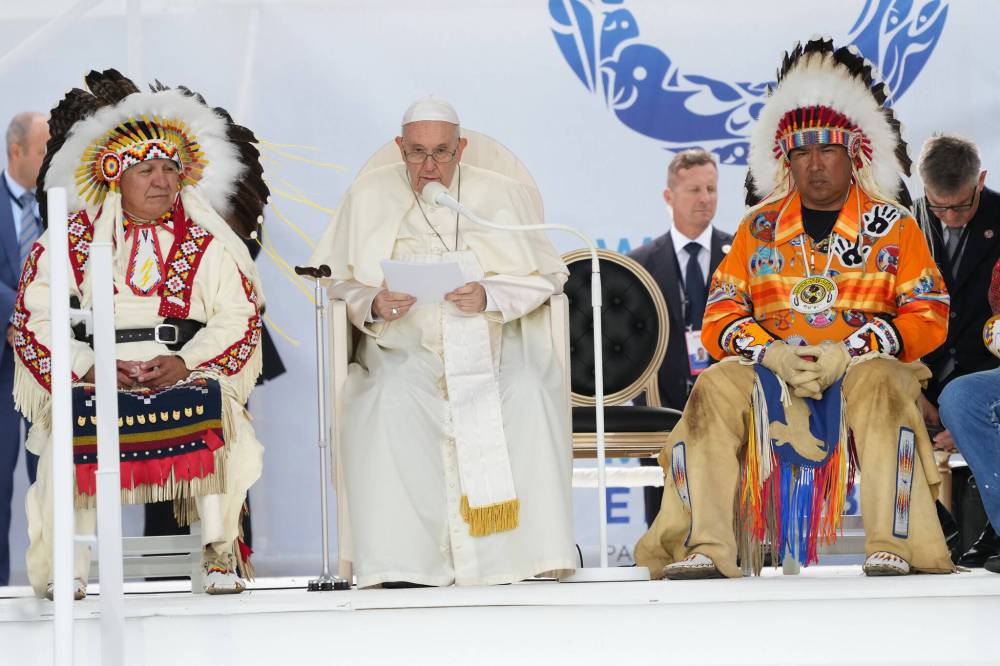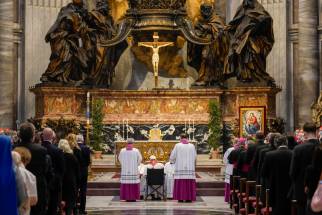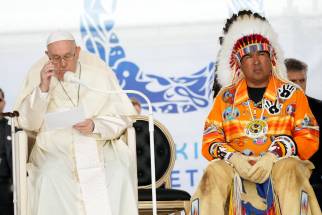Papal apology: sincere, specific, strategic
Read this article for free:
or
Already have an account? Log in here »
To continue reading, please subscribe:
Monthly Digital Subscription
$0 for the first 4 weeks*
- Enjoy unlimited reading on winnipegfreepress.com
- Read the E-Edition, our digital replica newspaper
- Access News Break, our award-winning app
- Play interactive puzzles
*No charge for 4 weeks then price increases to the regular rate of $19.00 plus GST every four weeks. Offer available to new and qualified returning subscribers only. Cancel any time.
Monthly Digital Subscription
$4.75/week*
- Enjoy unlimited reading on winnipegfreepress.com
- Read the E-Edition, our digital replica newspaper
- Access News Break, our award-winning app
- Play interactive puzzles
*Billed as $19 plus GST every four weeks. Cancel any time.
To continue reading, please subscribe:
Add Free Press access to your Brandon Sun subscription for only an additional
$1 for the first 4 weeks*
*Your next subscription payment will increase by $1.00 and you will be charged $16.99 plus GST for four weeks. After four weeks, your payment will increase to $23.99 plus GST every four weeks.
Read unlimited articles for free today:
or
Already have an account? Log in here »
Hey there, time traveller!
This article was published 26/07/2022 (1231 days ago), so information in it may no longer be current.
For some, it was the culmination of a long but necessary journey and the fulfillment of a years-overdue promise. For others, it was a gesture that fell short of what is required, and further reinforcement of the understanding that nothing, ever, can or will be enough.
As had been specifically prescribed in the Truth and Reconciliation Commission’s Calls to Action, Pope Francis on Monday voiced the words “I am deeply sorry” on Canadian soil. The apology was issued on Indigenous land — in Maskwacis, a community south of Edmonton that is the former home of the Ermineskin Indian Residential School, which was one of the largest such institutions in the country.
That the frail 85-year-old pontiff, whose mobility is limited, made the journey to Canada to make good on the promise he made to Indigenous people who met with him in Rome four months ago is certainly an indicator that this deeply symbolic gesture was offered sincerely and with a full sense of its importance in the difficult process of reconciliation Canada has undertaken.

Calling it a first step in a “pentitential pilgrimage” that will take him to several communities — none in Manitoba — during his six-day visit, the Pope offered an apology — voiced in his native Spanish and translated into English — that was strategically specific without being as all-encompassing as some would have desired.
“I ask forgiveness, in particular, for the ways in which many members of the Church and of religious communities co-operated, not least through their indifference, in projects of cultural destruction and forced assimilation promoted by the governments of that time, which culminated in the system of residential schools,” he said.
Pope Francis noted that while they were not without charitable intentions and instances of devotion to and care for children, the overall effects of policies linked to residential schools were “catastrophic” and “a disastrous error, incompatible with the Gospel of Jesus Christ.”
One residential-school survivor in attendance said, “Part of me is rejoiced; part of me is numb. I am glad I lived long enough to have witnessed this apology.”
What no one is likely to debate is that the Pope’s apology on Monday– adequate or not — is not the end of the matter.
Others, however, were quick to point out that the Pope’s address sought atonement for the actions of “many members of the Church,” but did not apologize for the institutional role of the Catholic Church itself in policies of colonization and cultural destruction.
Also at issue is the fact the apology referred to the “physical, verbal, psychological and spiritual abuse” suffered by children but did not mention sexual abuse, which Sagkeeng resident and survivor Carla Bruyer said “is what has had the most devastating impact on our communities.”
What no one is likely to debate is that the Pope’s apology on Monday — adequate or not — is not the end of the matter. Rather, it’s the starting point for a process that will, as the pontiff promised, include “a serious investigation into the facts of what took place in the past and to assist the survivors of the residential schools to experience healing from the traumas they suffered.”
More will be said, and other gestures of penitence offered, before the Pope concludes his Canadian journey on Friday. It will be up to each person who hears his words to decide what impact they will have on the reconciliation process.
As Ojibwe author/journalist Tanya Talaga said in a column in Tuesday’s Globe and Mail, “You have to sit with an apology. Let it sink in, roll the words over again and again in your mind. Consider if you will listen or not. Accept it or not.”













